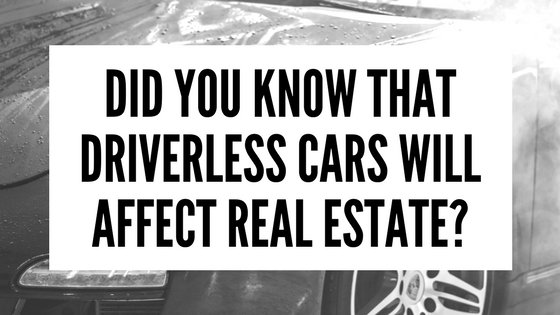Many car companies are announcing the arrival of the driverless car coming to their showroom. Philip E. Ross, the senior editor at IEEE Spectrum, reports that Jen-Hsun Huang, the CEO of Nvidia and Audi have plans to release driverless cars to market by 2020. With the possibility of driverless cars hitting the roads within a few years reach, their presence will make an impact society in many ways, one of the more significant impacts will be real estate.
Although autonomous vehicles coming to market is on the horizon, the impact will not affect the real estate industry until future generations. The most prominent issues that autonomous cars will cause in the future within the real estate industry include, a lower need for parking, increase the rate of suburban growth, and fall in retail property.
The introduction of driverless cars and car riding services, similar to Uber and Lyft, will decrease the need for parking lots. Brad Greiwe, co-founder and managing partner at Fifth Wall, states that driverless cars, “would free up 75 billion square feet of space.” Consider major shopping malls and businesses who purchase extra acreage solely for parking lots. With the increase of driverless cars, the demand for additional parking lots will decrease — causing companies not to buy extra land. For real estate agents, this means that the overall retail price will fall.
Driverless cars will offer a stress-free commute, allowing the driver to relax on the journey to their destination. Not having to deal with the anxieties associated with driving, makes users of the driverless car more likely to move out of the city to suburban neighborhoods. The suburbs offer cheaper housing options when compared to the urban housing. The demand for urban housing then will then decrease in correlation.
As autonomous vehicles rise, the real estate market will also see a decline in sales of retail property but a rise in warehouse property. CEOworld Magazine states that “Transportation, management, salesperson salaries and retail property rental costs make up 20–30% of the value of any product that’s for sale.” To eliminate that extra cost many companies are moving their business online and into warehouses. With the assistance of driverless vehicles, goods will be transported and delivered autonomously, which will reduce delivery times and lessen the need for retail space.
The real estate industry will have to alter their approach when it comes to selling and buying properties. Focusing on suburban residential properties as well as warehouse properties will prove to be the most beneficial investment. Although the real estate industry will be affected by the rise of driverless vehicles, the right strategy can still keep the industry alive.
